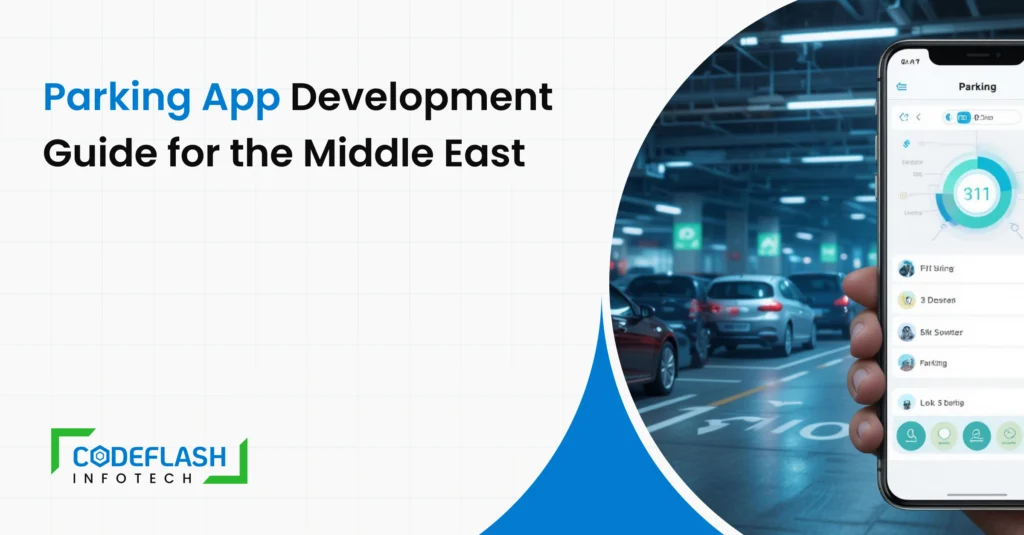
Parking App Development Guide for the Middle East
03 OCTOBER
The Middle East is undergoing an unprecedented pace in its history. Cities from Dubai and Abu Dhabi to Riyadh are witnessing a growing trend of car ownership, the emergence of business districts, and the establishment of comprehensive smart city initiatives.
Scarce Parking spaces and resulting Traffic pileups have never made a better time for smart parking app development in the Middle East. With grants and funding in sight, Governments are investing heavily in digital mobility programs, such as those included in the UAE Vision 2030 and Saudi Vision 2030 programs.
A parking management app in the Middle East is simplifying how drivers find empty spaces, all while helping to ensure that precious plots of land in crowded cities are used more efficiently, traffic flows with fewer snarls, and there are even fewer greenhouse gas emissions.
By 2026, AI-powered parking apps will be necessary, transforming the industry into a smarter, more reliable, and predictive one. That’s a huge opportunity for startups, businesses, and the technology sector.
In this blog, we have covered the cost to develop a parking app in the Middle East, and whether it is a parking reservation app for malls or a smart parking solution for towns, the sector is poised for rapid growth due to innovation, demand, and the arrival of AI-powered parking apps in Saudi Arabia.
What Is a Parking App?
A parking app is a mobile-first solution that enables drivers to find, book, and pay for parking spots in real-time. In 2026, it will do more than just find parking spots, which is different from regular navigation apps.
It can inform you when something will be available, update prices in real-time, and integrate with EV charging stations.
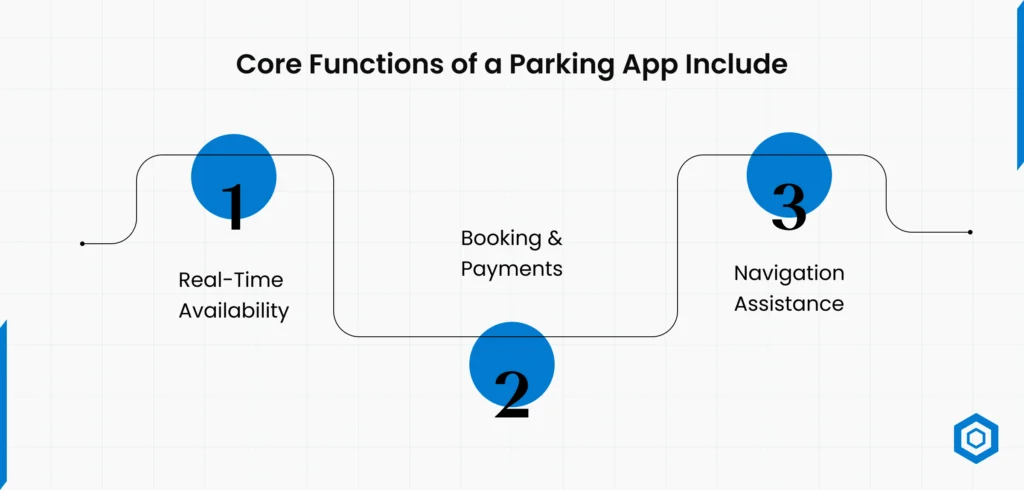
Core functions of a parking app include
- Real-Time Availability – Displays to users which spaces are available in their vicinity.
- Booking & Payments – You can book services and pay for them through the Service.
- Navigation Assistance – provides drivers with precise directions. Through AR maps and IoT sensors, it tells the driver exactly where to go.
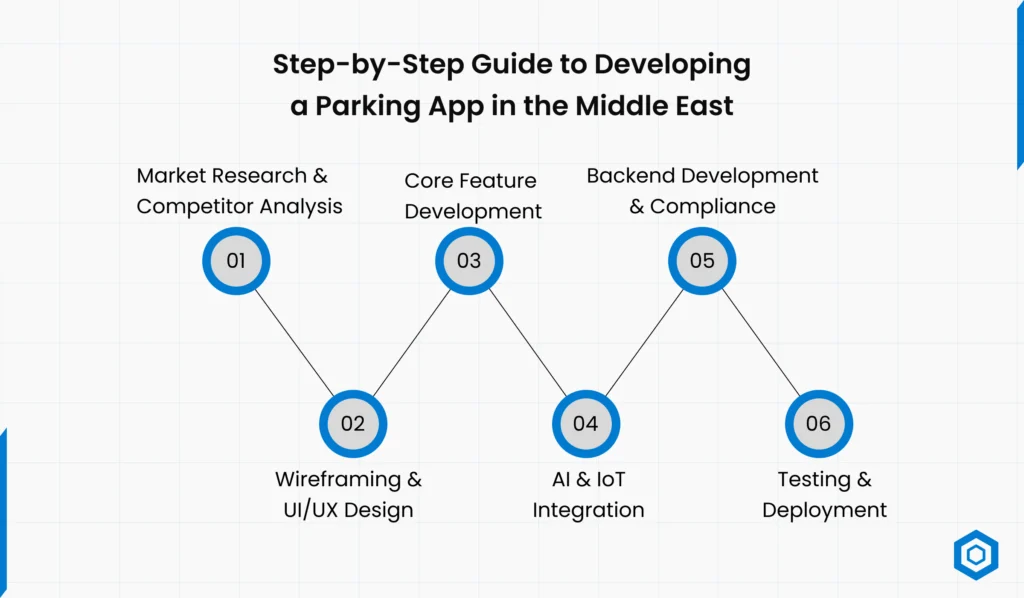
Step-by-Step Guide to Developing a Parking App in the Middle East
Developing a parking app in 2026 is no longer just about programming. Such a system focuses on user-centered development, adheres to local laws and regulations, and incorporates AI-endowed functions. For start-ups and big companies, here’s a playbook:
1. Market Research & Competitor Analysis
Navigation helps direct drivers to the precise location on maps and IOT sensors. Note gaps such as a lack of predictive analytics, limited payment methods, or no EV support. This will ensure that your Parking app development in the Middle East fixes some of the real-time problems.
2. Wireframing & UI/UX Design
The application must look simple without appearing cheap. Wireframes to help you visualize the flow and UI/UX design, making navigation easy and intuitive. The app must be multilingual (Arabic & English) and support multiple currencies to be accepted in the UAE, Saudi Arabia, or the broader Middle East region.
3. Core Feature Development
Current space tracking, booking systems, payment gateways, and navigation are the most critical components of your app. When creating a parking reservation app, end-users need to be able to trust that it will function properly and respond promptly.
4. AI & IoT Integration
AI Software Development can determine the demand, identify the optimal location, and adjust prices accordingly. By integrating IoT sensors, it collects real-time parking data and displays the closest available spaces to users.
5. Backend Development & Compliance
It supports thousands of simultaneous users due to a powerful back-end. Mobile app development for parking in the Middle East must comply with the cyber laws of the UAE and Saudi Arabia. APIs that are safe, data that is encrypted, and data that is compliant with GDPR are all very important.
6. Testing & Deployment
Testing includes load testing, UI checking, and security review. Beta launches in Dubai, maybe proving in the real world, before it unleashes. Real-time monitoring ensures that users have a consistent and positive payment experience.
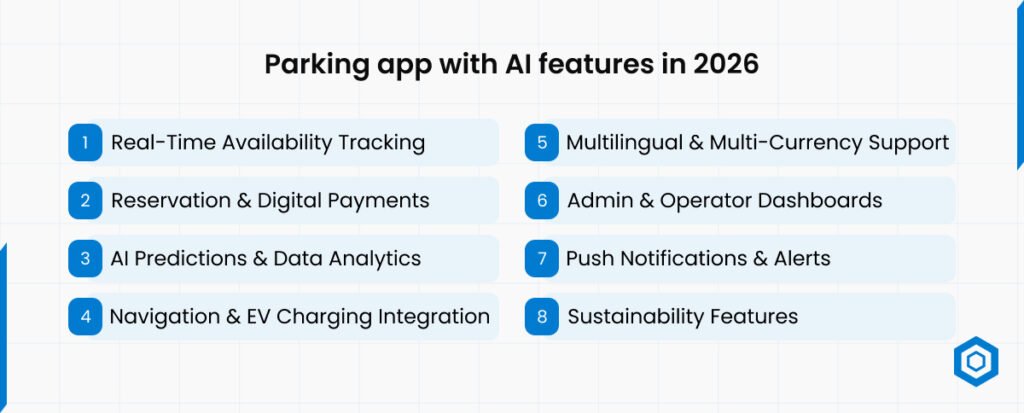
Parking app with AI features in 2026
To stand out in a competitive market, your parking app must include the following:
1. Real-Time Availability Tracking
This is the core of any parking app. This has generated user expectations regarding the up-to-the-minute availability of spaces, whether in a mall, an office, or the city center.
With IoT sensors and cameras, the app would automatically update the availability of a spot. The integration not only saves them time but also reduces city traffic in both Dubai and Riyadh.
2. Reservation & Digital Payments
One parking reservation app is a means for customers to pre-book their parking space before arriving. This way, there is no confusion, and things are a lot less stressful at the last minute.
Combined with secure digital payments (such as cards, wallets, Apple Pay, or blockchain), it fosters trust and delivers a seamless user experience. Especially in the Middle East, Sharia-compliant and multi-currency payments are crucial.
3. AI Predictions & Data Analytics
AI is revolutionizing parking management. Algorithms that predict when demand will be high, based on traffic, weather, and events, can be helpful.
During the Dubai Expo, for example, or when there are Formula 1 races in Riyadh, it can predict parking demand around those neighborhoods. Operators can also monitor revenues and adjust pricing models through an analytics dashboard.
4. Navigation & EV Charging Integration
Taking you to the spot, a Middle Eastern parking app for ride-hailing services takes you not merely to available parking, but to a pre-sold tabloid, with GPS and indoor navigation directions.
That’s increasingly a must as EV share grows in the UAE and Saudi Arabia. The app is future-proof, allowing drivers to book parking and EV charging simultaneously.
5. Multilingual & Multi-Currency Support
The expat community is substantial, and as such, the Middle East is extremely diverse. A smart parking management app in the Middle East needs to facilitate at least two languages (Arabic and English), if not more.
6. Admin & Operator Dashboards
Customers can only see the home page, but we need efficient dashboards for the managers to keep things running smoothly. Key features include real-time occupancy reporting, pricing flexibility management, fraud detection, and financial analytics. That means the app is a full-stack smart parking management solution for cities and private operators, instead of just a consumer technology.
7. Push Notifications & Alerts
Users remain interested when reminded of the actual date. Notices can also inform drivers when their parking is about to expire, when they have been charged, and when new parking deals become available.
8. Sustainability Features
Smart parking apps reduce CO₂ emissions by reducing the time spent driving aimlessly. Some of the apps even feature carpooling options or promote eco-friendly parking solutions, a nice match for the smart city visions that the U.A.E. and Saudi Arabia are striving to push forward as well.
Cost of AI-powered parking app development in the Middle East
So, here’s the estimated parking app development cost in 2026 to help your app stand out in a competitive market:
You can enhance it further by integrating an AI chatbot to improve customer support and boost user engagement. For a deeper understanding, check out our blog How to Build an AI Chatbot? A Complete Guide, where we break down everything you need to know about chatbot integration.
1. Basic MVP Parking App – $15,000 to $25,000
It’s a very basic app with a simple spot locator, static maps, registration, and bookings parts. It may be useful for fledgling firms or pilot operations to test demand. Ideal for parking reservation app development, the cost is here.
2. Standard Parking App – $25,000 to $65,000
The technology provides real-time availability, parking filters, makes reservations on the phone and online, and offers online payment solutions at this level. There are also notification and basic admin dashboards.
Among other mobile applications for parking projects in the Middle East region (malls, business parks, and gated communities) tended to fall under this level.
3. Advanced AI-Powered Parking App – $65,000 to $1,50,000
In 2026, AI in parking app development will utilize predictive analytics to forecast demand, detect fraud, and provide personalized parking recommendations. In the first variant, real-time IoT sensors are used to guarantee higher precision.
At this level, the applications in question must be multilingual (in Arabic and English) and multicurrency in nature for use in the deployment of Dubai and Riyadh smart city pilots.
4. Enterprise Parking Management System – Get A Quote
Apps at the “enterprise class” level aim to support either cities, airports, or other large smart city deployments. Features include:
- IoT sensor network for spot sensing.
- AI-driven dynamic pricing
- EV charging integrations
- Blockchain-based secure payments
- City operator advanced analytics dashboards.
And this is how much these countries are currently investing in smart parking ecosystems in the UAE and Saudi Arabia.
5. Regional Influence on Cost
- UAE (Dubai, Abu Dhabi): Expect a 20–30% premium due to mature compliance and cybersecurity laws, as well as very high user expectations for design and functionality.
- Saudi Arabia (Riyadh, Jeddah): A strong push under Vision 2030 for smart city and parking management app projects in the Middle East. Prices are moderate here, though they’re ticking up because of demand.
6. Key Influencing Factors
- Tech Stack Choices: Native iOS + Android apps are performing better, but also come with a price for implementation, in comparison to cross platforms, such as Flutter or React native (this will save you around 25–30% of costs).
- UI/UX Design: High-quality designs with multilingual, smooth flows increase value by $3,000–$7,000 – but they’re absolutely necessary if you want to be accepted in Middle Eastern markets.
- AI & IoT Extras: If you want landing pages optimized for search and features such as predictive parking, license plate recognition, and IoT sensors, it can raise the price between $10,000–$25,000, but also make sure your app is future-proofed, which is the level of investment targeted at tech companies.
Role of AI in Parking App Development in 2026 Middle East
Parking solutions can no longer afford to let AI be a ‘niche’. It’s the core differentiator. By 2026, AI for parking apps will also help users make better decisions, create a more comfortable experience, and optimize economic value.
1. Dynamic Pricing Models
AI to adjust your prices automatically based on demand, time, or location. Parking in central Riyadh can be more expensive during peak times of the day, and parking further out in the city is cheaper, thereby leveling usage.
2.Fraud Detection & Security
AI-based algorithms identify unusual patterns, prevent ticketing fraud in the form of order duplication, and secure the payment gateway in a way that is fundamental to comply with the UAE and Saudi Arabia’s regulations.
3. Personalized User Experiences
The app makes recommendations for popular sites, provides discounts, and identifies the nearest EV charger based on past behavior.
In general, AI features boost customer satisfaction for startups and organizations, justifying an average Middle Eastern charge for AI-powered parking app development.
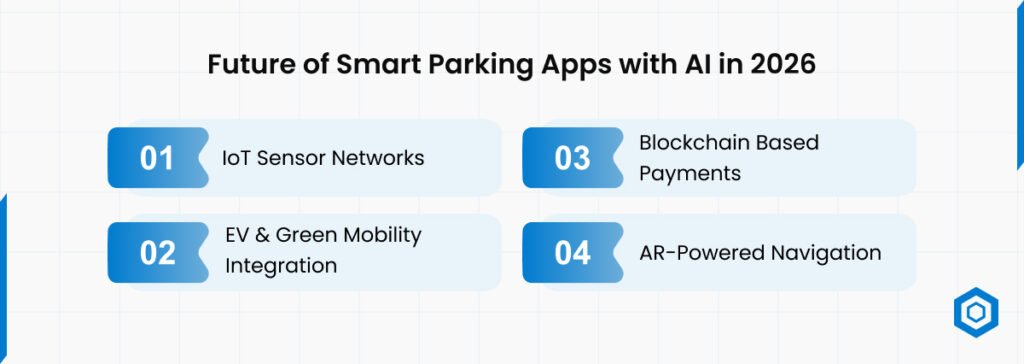
Future of Smart Parking Apps with AI in 2026
The future of parking apps with AI in 2026 is likely to be integrated into smart city ecosystems across the Gulf. These applications will transform from single-purpose primitives into complete urban mobility ecosystems.
1. IoT Sensor Networks
Parking apps will integrate with city-installed IoT sensors and deliver real-time data to drivers and operators. This renders the city-level parking management apps in the Middle East more trustworthy and easier to use.
2. EV & Green Mobility Integration
For those embarking on the electric car transition, reservations for electric vehicle charging stations will be added to parking apps. At this moment, even in Dubai and Riyadh, governments are beginning to provide incentives for green mobility, making it a necessity or must-have feature for the upcoming smart parking apps with AI by 2026.
3. Blockchain-Based Payments
For high-value payments, you are looking for a tamper-proof, transparent way to view transactions with clarity on who, and this is where blockchain comes in. When it comes to corporate-level parking reservation app development, the role of blockchain in strengthening security is of utmost importance.
4. AR-Powered Navigation
AR is also expected to become a tool in guiding people through complex parking facilities by showing arrows or directions through their smartphone cameras. This adds value for malls, airports, and stadiums in the UAE and Saudi Arabia.
Conclusion
Partner with Codeflash Infotech for Smart Parking App Development
As the Middle East leads the way in smart city innovation, parking apps play a crucial role in this transition. Whether you are a start-up providing an MVP or a government entity designing a city-wide parking management app in the Middle East, success depends on developing scalable, secure, and AI-powered platforms.
At Codeflash Infotech, we are a parking app solution provider in the Middle East, specializing in mobile app development. To be a part of this mobility revolution in the UAE, Saudi Arabia, and around the world, get in touch and tell us about your parking app business idea.
Frequently Asked Questions
The cost to build a smart parking app in the UAE can vary between $15,000 for a basic MVP and over $150,000 for enterprise-level AI apps.
Artificial intelligence enables apps such as personalized parking, dynamic pricing, and fraud prevention. That’s a significant reason why people in the Middle East are developing parking apps using AI.
Annual maintenance costs 15–20% of the initial development budget for bug patches, new features, and compliance updates.
Table of Content
Core functions of a parking app include
Step-by-Step Guide to Developing a Parking App in the Middle East
Parking app with AI features in 2026
Cost of AI-powered parking app development in the Middle East
Role of AI in Parking App Development in 2026 Middle East





